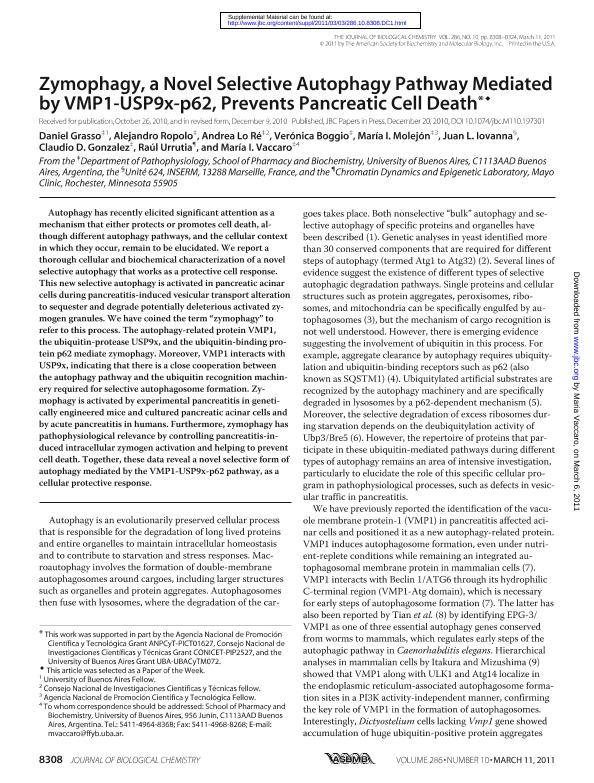Artículo
Zymophagy, a novel selective autophagy pathway mediated by VMP1-USP9x-p62, prevents pancreatic cell death.
Grasso, Daniel Hector ; Ropolo, Alejandro Javier
; Ropolo, Alejandro Javier ; Lo Ré, Andrea Emilia
; Lo Ré, Andrea Emilia ; Boggio, Verónica; Molejon, Maria Ines
; Boggio, Verónica; Molejon, Maria Ines ; Iovanna, Juan L.; Gonzalez, Claudio D.; Urrutia, Raúl; Vaccaro, Maria Ines
; Iovanna, Juan L.; Gonzalez, Claudio D.; Urrutia, Raúl; Vaccaro, Maria Ines
 ; Ropolo, Alejandro Javier
; Ropolo, Alejandro Javier ; Lo Ré, Andrea Emilia
; Lo Ré, Andrea Emilia ; Boggio, Verónica; Molejon, Maria Ines
; Boggio, Verónica; Molejon, Maria Ines ; Iovanna, Juan L.; Gonzalez, Claudio D.; Urrutia, Raúl; Vaccaro, Maria Ines
; Iovanna, Juan L.; Gonzalez, Claudio D.; Urrutia, Raúl; Vaccaro, Maria Ines
Fecha de publicación:
03/2011
Editorial:
American Society For Biochemistry And Molecular Biology
Revista:
Journal Of Biological Chemistry
ISSN:
0021-9258
Idioma:
Inglés
Tipo de recurso:
Artículo publicado
Clasificación temática:
Resumen
Autophagy has recently elicited significant attention as a mechanism that either protects or promotes cell death, although different autophagy pathways, and the cellular context in which they occur, remain to be elucidated. We report a thorough cellular and biochemical characterization of a novel selective autophagy that works as a protective cell response. This new selective autophagy is activated in pancreatic acinar cells during pancreatitis-induced vesicular transport alteration to sequester and degrade potentially deleterious activated zymogen granules. We have coined the term “zymophagy” to refer to this process. The autophagy-related protein VMP1, the ubiquitin-protease USP9x, and the ubiquitin-binding protein p62 mediate zymophagy. Moreover, VMP1 interacts with USP9x, indicating that there is a close cooperation between the autophagy pathway and the ubiquitin recognition machinery required for selective autophagosome formation. Zymophagy is activated by experimental pancreatitis in genetically engineered mice and cultured pancreatic acinar cells and by acute pancreatitis in humans. Furthermore, zymophagy has pathophysiological relevance by controlling pancreatitis-induced intracellular zymogen activation and helping to prevent cell death. Together, these data reveal a novel selective form of autophagy mediated by the VMP1-USP9x-p62 pathway, as a cellular protective response.
Palabras clave:
Autophagy
,
Cell Death
,
Pancreas
,
Ubiquitin
,
Vesicles
,
Pancreatitis
,
Usp9x
,
Vmp1
Archivos asociados
Licencia
Identificadores
Colecciones
Articulos(OCA HOUSSAY)
Articulos de OFICINA DE COORDINACION ADMINISTRATIVA HOUSSAY
Articulos de OFICINA DE COORDINACION ADMINISTRATIVA HOUSSAY
Citación
Grasso, Daniel Hector; Ropolo, Alejandro Javier; Lo Ré, Andrea Emilia; Boggio, Verónica; Molejon, Maria Ines; et al.; Zymophagy, a novel selective autophagy pathway mediated by VMP1-USP9x-p62, prevents pancreatic cell death.; American Society For Biochemistry And Molecular Biology; Journal Of Biological Chemistry; 286; 10; 3-2011; 8308-8324
Compartir
Altmétricas



